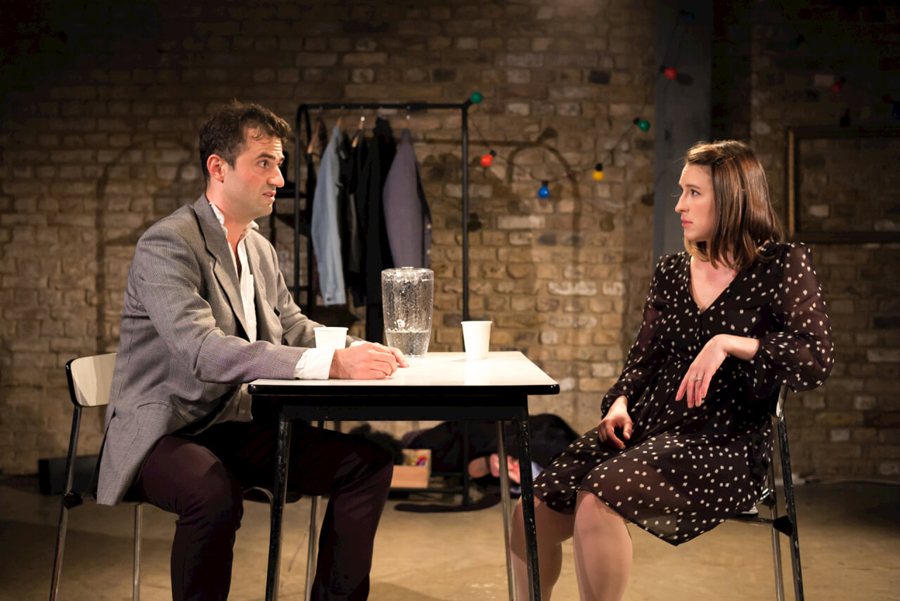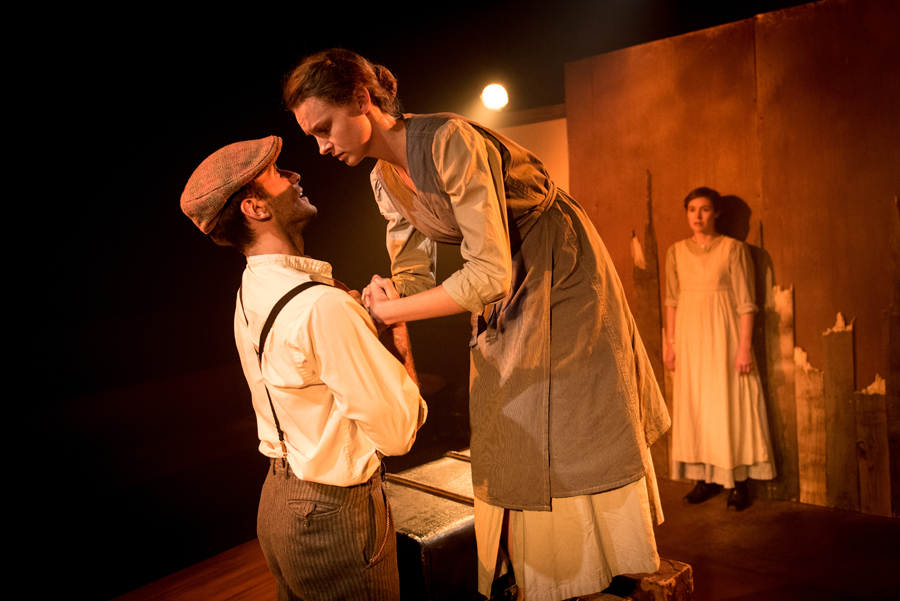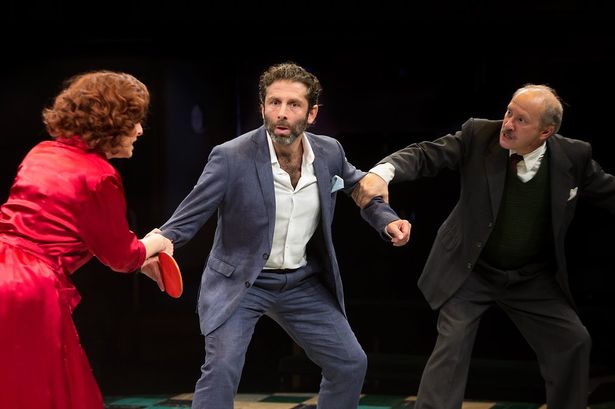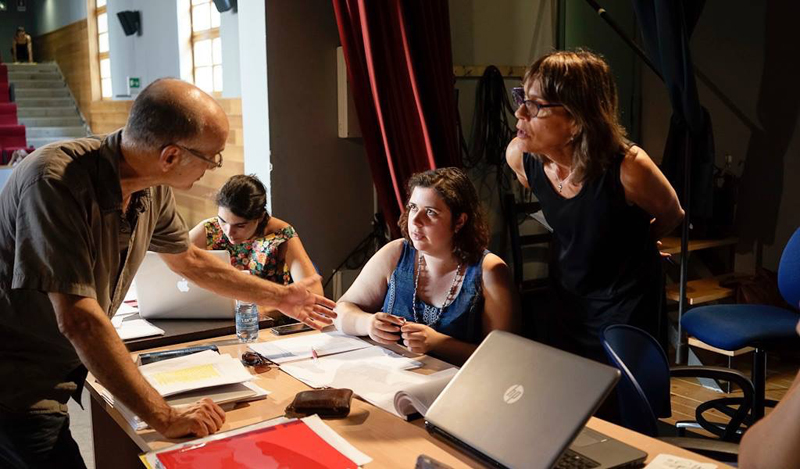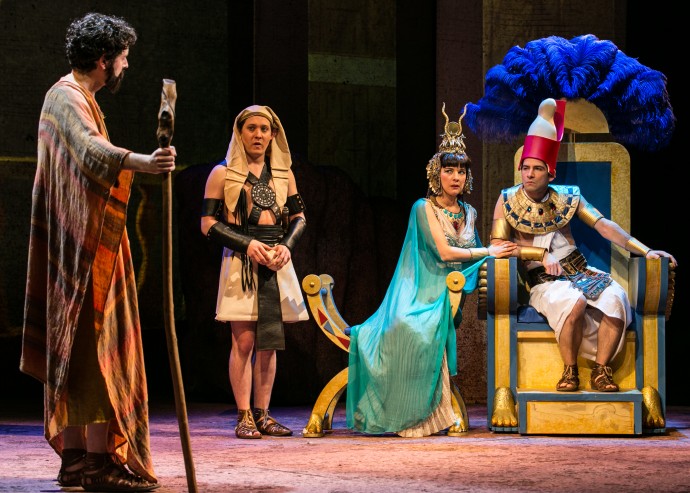 It’s not by accident that the title of this review recalls Yeats’ poem Easter 1916, so often quoted in this centenary year of the Easter Uprising in Ireland. Lorraine Hansberry was inspired to become a dramatist by seeing a rehearsal of Sean O’Casey’s Juno and the Paycock at university. And she saw parallels in the struggle for Irish independence with the struggles for equality of both African Americans and the nations in Africa under white rule.
It’s not by accident that the title of this review recalls Yeats’ poem Easter 1916, so often quoted in this centenary year of the Easter Uprising in Ireland. Lorraine Hansberry was inspired to become a dramatist by seeing a rehearsal of Sean O’Casey’s Juno and the Paycock at university. And she saw parallels in the struggle for Irish independence with the struggles for equality of both African Americans and the nations in Africa under white rule.
In Les Blancs (The Whites), Lorraine Hansberry was notably the first African-American dramatist to explore the African search for freedom from European colonization. The first drafts of Les Blancs came soon after the success of her landmark play, A Raisin in the Sun in 1960. Although at the beginning of 1965, she was dead from pancreatic cancer, aged 34, she left several drafts of the play. Its title is an answer to Jean Genet’s play The Blacks: A Clown Show, a ritual performance of black resentments against the white oppressor. She saw Genet’s absurdism as escapist, when realism was what was required. Her own story of being black and female in America, To Be Young, Gifted and Black, like Les Blancs, came to the stage thanks to her literary editor and former husband, Jewish publisher, songwriter and political activist Robert Nemiroff. Hansberry’s death inspired Nina Simone to write her famous song in her memory using the poignant title of her autobiography.
Hansberry entrusted Les Blancs, the work she was redrafting in hospital during her last illness, to Nemiroff to nurse into production. He continued to make further drafts based on notes and their conversations and gathered all the drafts into a production text so that it premiered in New York in 1970. Nemiroff kept polishing the script, publishing a revised version in 1983. He died in 1991 and his stepdaughter Joi Gresham, Director and Trustee of the Lorraine Hansberry Literary Trust, collaborated with dramaturg Drew Lichtenberg and director Yael Farber on the text of this National Theatre production.
The storyline is ostensibly clear enough. The people of a fictitious African nation are on the point of rising up to fight their colonial overlords and masters and establish an independent state and the action is seen through the experience of settlers, natives, and an American journalist in the waning days of colonial control.
Although she never went to Africa, what Hansberry brings to the stage in Les Blancs is an extraordinary vivid and credible account of the flashpoint of the struggle in one unnamed African country in the middle of the 20th century, which could stand for them all. At the same time, her play is also a comment on the struggles against racism and inequality in her native country two years before Martin Luther King delivered his "I Have a Dream" speech. Hansberry wanted to reflect the inequality of the African-American voice in the black/white conversation at the time and an African setting gave a useful distance from which to pillory the strategy and reasoning of American Civil Rights leaders.
In South African-born Farber, 51 years after her death, Hansberry’s play has found a director to fashion a production she would surely have relished. Hansberry writes into her play African-based folklore, chanting, drumming, and dancing, serving both to heighten the tension and reflect the ceremonial role of music and dance in traditional African life. And from its opening minutes Farber brings her play to full-blooded life with the entry of four Matriarchs, who accompany their slow, dignified passage across the stage with an extraordinary and obviously authentic chant (one of the four, Joyce Moholoagae, is Music Director) amid the heady, acrid smell of incense . Add to this Adam Cork’s music and pretty continuous soundscape and Tim Lutkin’s lighting, almost characters in themselves, on Soutra Gilmour’s set, a skeletal mission hospital and living quarters complete with veranda, steadily revolving in the centre of the village it serves under the dark star-studded velvet of the African night sky, and there is tension, even menace, built in from the start.

Then there is the striking, etiolated figure of Sheila Atim’s Woman, slowly stalking around the set under the burden of a flaming firepot. Hansberry originally planned to have a female protagonist, but revised the play so this, the only black woman, has no name and no lines. And yet the impact of Atim’s presence is unsettling from the start and eventually devastating. An accusing mother Africa indeed.
By the time a procession of white characters enters from the audience to the contrasting plangent western strains of a cello (one of them is indeed carrying, though not playing, a cello – the chosen instrument of the Albert Schweitzer-like figure who founded the mission), before a word has been spoken, Farber has established her credentials.
And yet this is nothing if not a wordy play, a play of dialectic and conversation, as well as action and ceremony. There is an elegant pairing of characters – offstage that legendary missionary who has founded the mission, away visiting his flock and the village tribal elder on his deathbed; arriving in the village, journalist Charlie Morris, keen to write about the success of the white man’s mission in both senses of the word and Tshembe Matoseh, eldest son of the dying elder returning home from London, where he now lives with his wife and child, to attend his father’s deathbed.
Morris is of course a useful ‘outsider’ lens through which to ‘meet the natives’, both black and white. Elliot Cowan makes of Morris a wonderfully persistent and resilient terrier resolutely going for the killer interview, even when he is by turns sent up and scorned by Danny Sapani’s toweringly intelligent and complex Tshembe.
When he tries to ply Tshembe with whisky and cigarettes, Tshembe retorts with a series of telling put downs. It’s hard to come back from “Do you really think the rape of a continent dissolves in a wreath of cigarette smoke?”, but Morris does his best even if he is not quite a match for Tshembe. It’s a long exchange but a telling and a gripping one and it’s at the heart of this play.
Morris fares better with the missionary doctors, Anna Madeley’s hard-working idealistic Dr Gotterling and James Fleet’s disillusioned, Chekovian Dr Dekovan (another of Hansberry’s neat pairings) - both excellent. And he is welcomed with open arms by Madame Neilson, the absent missionary’s elderly, almost blind but resilient wife (a wonderfully detailed performance from Siân Phillips), embodying the hopes and dreams of the long-term white settler who has thrown in her lot with the continent and done all in her power - and with her mindset - to make bridges with its people. Her blindness is symbolic and indeed she even declares that she is pleased not to be able to see the horrors going on around her as the events of the play become ever darker.
This is down in no small part to Major George Rice, representative of white rule and the British army, first seen dragging behind him a tortured and bleeding native whom he has been interrogating. Clive Francis plays the terrifying racist martinet to the hilt, spitting out the word boy he uses to address the black villagers. It’s a chilling counterpart (again a pairing) to Madame Nielsen’s love of this continent to hear him speak lyrically of the land on which he has settled, when he clearly regards its inhabitants as sub human. There are shades of Steve Biko, whose death in custody in South Africa caused armed insurrection, when a similar case gives those inhabitants all the incitement they need to rise up against The Whites of the title.
Hansberry ratchets up the tension by condensing the action into just a matter of hours, almost into real time. No sooner is his father dead than Tshembe is caught between two worlds – the West that he has left behind and his native village where he trapped by an insurrection he is urged to join. And then there are his two brothers, desperately sincere Abioseh (Gary Beadle), who has found his home in the church and Eric, the anguished illegitimate product of mixed race parentage (a heartbreakingly convincing performance form Tunji Kasim). All three are damaged and defined by the rape of their native land and the bloody struggle it is undergoing.
By the time the play reaches its stunning, terrifying climax, Tshembe has evoked Anne Frank, Auschwitz and Dachau. Hansberry’s vision, realized by Farber, Lichtenberg and Gresham, has a terrible beauty indeed.
By Judi Herman
Les Blancs runs until Thursday 2 June, 7.30pm & 2pm, £15-£35, at National Theatre, South Bank, SE1 9PX; 020 7452 3000. www.nationaltheatre.org.uk
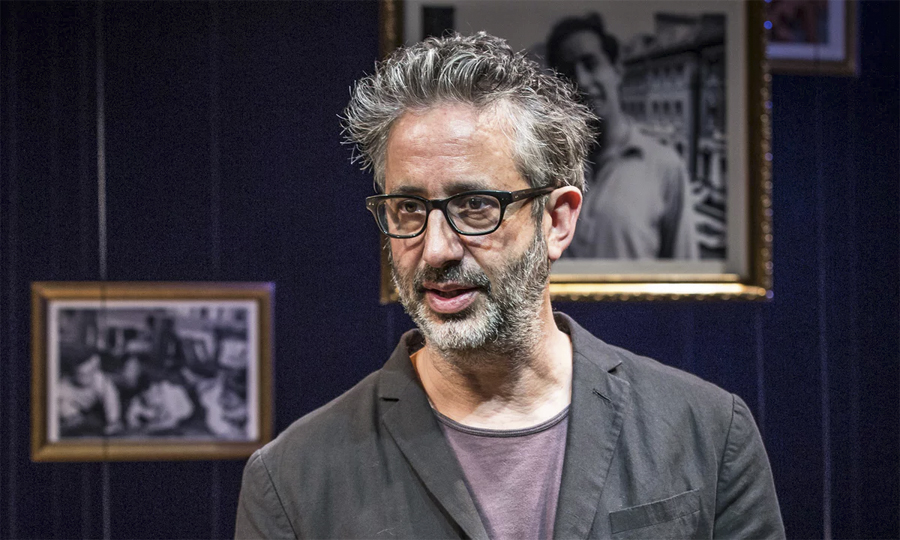 Often at shiva prayers it strikes me how much the late-lamented might have enjoyed the gathering of nearest and dearest, but would they have enjoyed the eulogies? Might they not have confessed (or complained) “that’s not the real me, warts and all”? David Baddiel goes further in his scurrilous tribute to his late mother, who died suddenly in 2014. He confides in his audience that Sarah Baddiel loved not only being centre stage, but also a bearded, pipe-smoking golf salesman for 20 years – apparently unnoticed by her husband, even wangling him an invitation to David’s bar mitzvah. Seriously, he’s there in the photo album.
Often at shiva prayers it strikes me how much the late-lamented might have enjoyed the gathering of nearest and dearest, but would they have enjoyed the eulogies? Might they not have confessed (or complained) “that’s not the real me, warts and all”? David Baddiel goes further in his scurrilous tribute to his late mother, who died suddenly in 2014. He confides in his audience that Sarah Baddiel loved not only being centre stage, but also a bearded, pipe-smoking golf salesman for 20 years – apparently unnoticed by her husband, even wangling him an invitation to David’s bar mitzvah. Seriously, he’s there in the photo album.



